
DENNIS BROWN
A LITTLE BIT MORE: JOE GIBBS 12" SELECTION 1978-83 (VP4115)
CULTURE & THE DEEJAYS AT JOE GIBBS 1977-79 (VP4116)
Reggae fans are easily satisfied. Give them a new mix of some old favourites: a dub plate or a deejay toast over a familiar lyric, whether from Motown or Trenchtown, and they are happy. The legacy of Joe Gibbs is thus celebrated in some new releases from 17 North Parade. The original 17 North Parade is the site of Randy's Record Mart in Kingston; the current label is based, appropriately, in Jamaica, New York. Culture and the Deejays at Joe Gibbs 1977-79 showcases the voice of Joseph Hill of Culture, backed by the Professionals: Sly and Robbie, Sticky, & the horn line-up of Vin Gordon on trombone, Bobby Ellis on trumpet, Herman Marquis on alto and Tommy McCook on tenor sax. These 11 extended mixes feature the toasts of some lesser-known deejays -- Bo Jangles, Shorty the President, Prince Mohamed, Nicodemus -- along with better-known luminaries of the microphone like I-Roy, Clint Eastwood & Prince Far I. It's really intense and maybe a bit too much to listen to all the way through. Also there are some inane lyrics like "Baldhead Bridge is burning down" to the nursery tune of "London Bridge is burning down." The bass and drums are relentless and about an hour in you start wishing for a bit more dub and less toasting! (The Bo Jangles toast "Selassie I Cup" is something you only need to hear once, if at all.) However there are some outstanding rare grooves on here and it is always a pleasure to listen to the warm earthy tones of Joseph Hill.
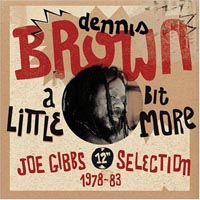
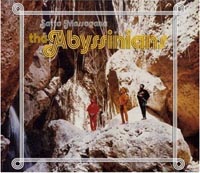
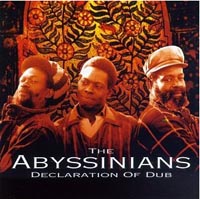
THE ABYSSINIANS
SATTA MASSAGANA (De-luxe edition: Heartbeat HB 11661-7838-2)
DECLARATION OF DUB (Heartbeat HB180)
In a moment of weakness I bought the Abyssinians' masterpiece, Satta Massagana, in its latest remastered CD incarnation, though I have the vinyl and really should've just remastered it myself. It always sounds fine as a line-in to my MAC from my turntable and I could've found the dubs on other albums bumbs bums zumzum and then downloaded the one track I did not have for 99 cents. Still it would've taken all day, so was it worth it to save $12, probly not. Generally I want the package to get the liner notes etc, but this one from Heartbeat is singularly unattractive. Need to find my glasses to read it, first off. (While even Trojan is starting to make its repackaging smart, like Pressure Sounds or Blood & Fire, Heartbeat has very little aesthetic sense.) "Satta Massagana," now a well-known reggae anthem, was actually spun off from Carlton and the Shoes' song "Far Land." Carlton was the successful brother of the Manning family, though the eldest was a priest at the Ethiopian Orthodox church in Dungle where the hard-core rastas gathered. Among them Mortimer Planno and Count Ossie were talking about the Back to Africa movement in the 60s. The other Manning brothers saw their music as more spiritual than Carlton's pop. "Satta" was not a hit when it was released in 1969 but the group went into Federal studios and cut "Leggo Beast," and "Reason Time." "Declaration of Rights," recorded at Studio One, was their first hit (Heard on a couple of compilations, including Studio One Story and Studio One Gold, it has evolved: initially it was more ghostly with an organ intro and more aetherial harmonies). Lloyd Daley heard them and invited them to his Matador label where they cut "Y Mas gan" and that 1972 version (which also has the edge on the later take) with Daley's dub can be heard on Matador Productions (HB92). They rerecorded their material after bootleggers started making money from their songs, and put them out on the Clinch Records label, which had a clenched fist as the logo. After ten years the group broke up in 1979, but a decade later there was such a resurgence of interest in reggae in the wider world, especially in deeply rootical reggae, that the Abyssinians reformed. Supreme Jamaican vocalist Carlton Manning has even fronted the band when Collins decided to have a solo career and he can be heard on guitar and backing vocals on "Poor Jason Whyte" and "Jerusalem." I was sorry that he was relegated to guitar when they toured & played Maritime Hall in SF, but their attempt to do a Carlton song (which he dedicated to me in one of those astounding moments when you are name-checked by a band on stage and don't believe your ears) backfired and the fans didn't get it. I went backstage and had my photo taken with Carlton but he had just changed out of his turban and robes so it was not the grand "Elvis & Nixon"-style portrait I had hoped for. To get it right, if you are fanatic like yours truly, you need to add in the versions from Declaration of Dub (HB180) to this latest Satta set. Though the songs were recorded at Federal, Harry J and Joe Gibbs' studios, with different musicians, there is a holistic quality to them (as General Smuts would style it). There's a big horn section, occasionally Bongo Herman and Les throw off some ripping bongo (Bongo Herman fronted the killer version of "Satta" known as "Thunderstorm" which is on the Declaration of Dub disc.) You may want to add Bernard Collins' remake "Satta me no born yah" and the toast by Dillinger that was the B side from the Tree of Satta album. There are also U-Roy, Big Youth and Prince Far I toasts over the rhythm if you are not sick of it yet. But you may prefer to keep the disc and the dubplates separate, I go back and forth about this. --[An example is Hugh Mundell's classic Africa must be free by 1983. In 1989 RAS records put the two albums out on one CD (RAS CD2301) but ran them one after another, so you have the studio album followed by the Augustus Pablo dub album which is the way I had put them on cassette and actually it works fine.]-- The names change from disc to disc. you may know "Y mas gan" as "Yin mas gan", etc. "Forward on a yard" becomes "Send us home to Zion": there must be a message in there somewhere. Ah yes, 2 Timothy 4:23...
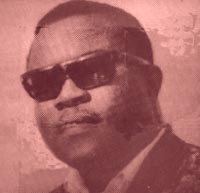
JOE GIBBS
JOE GIBBS & FRIENDS: The Reggae Train (Trojan TRLS 261)
BLOW MR HORNSMAN (Trojan TRLS 257)
Reggae music is as much about the producers as the singers. Names like Coxone Dodd, Lee Perry, King Tubby, & Duke Reid are synonymous with types of music, whole moods. And now another of the pioneers, Joe Gibbs, has died (in February 2008). His career spanned the whole development of the music, from Rocksteady to Reggae to Dancehall, and with Errol Thomson he formed a duo, The Mighty Two, who did their own versions on the singles they were producing. He put out on music on the Amalgamated label as well as under his own name and that of Errol T. Born Joel Gibson in Montego Bay, 1945, he studied electronic engineering in the USA and returned home to open a TV repair business. He began selling imported records and then started producing. His first effort was Roy Shirley's "Hold them," which was a huge hit in 1966. He cut a deal with Trojan to reissue his songs and had hits on the Pioneers, Stranger & Gladdy, and Errol Dunkley. Lee Perry came from Studio One to engineer for him and Perry was followed by Winston Holness ("Niney the Observer"). As Rocksteady gave way to reggae he found Clancy Eccles and Junior Byles, who started out fronting the Versatiles, one of the rude groups of this era. Arguably Gibbs' greatest discovery was the underrated singer Ken Parker, who combined Sam Cooke's soul with the pop wistfulness of Brook Benton. Joe Gibbs himself sang "People grudgeful" as a reply to Lee Perry's ingratitude expressed on "People funny boy." The Slickers (who waxed the immortal "Johnny Too Bad"), the Soulmates, the Reggae Boys, and better-known Peter Tosh all appear on Joe Gibbs and Friends, one of the most satisfying reggae compilations ever, but currently out of print. Althea and Donna's "Uptown Top Rankin" was a song that crossed over to the Top Ten in the UK where the culture is generally more open to outside ideas (like Bhangra) and where Top Rank is the name of a chain of ballrooms, in case you were wondering what it meant. Gibbs released songs from Errol T. records, as well as on his own Gibbs label, and even one called Crazy Joe. Lynn Tait and the Jets and Tommy McCook's Supersonics were the main house bands. The Heptones and the Pioneers were the most prolific bands on his labels during the Rocksteady era. His hits included "A So We Say" by Big Youth, "Heavy Manners" by Prince Far I, "Long Shot" by the Pioneers, "Maga Dog" by Peter Tosh, "Money In My Pocket" by Dennis Brown, "Two Sevens Clash" by Culture, "Uptown Top Ranking" by Althea & Donna, "Wreck A Buddy" by The Soul Sisters, & "You're Gonna Need Me" by Errol Dunkley. A lot of these hits are gathered on the 2-CD set LOVE OF THE COMMON PEOPLE (Sanctuary). I recommend anything by him you can find. Though all the Trojans are currently out of print, the Rocksteady comps include EXPLOSIVE ROCKSTEADY JOE GIBBS' AMALGAMATED LABEL 1967-73 (Heartbeat HB72), The Mighty Two (HB73), BLOW MR HORNSMAN: Instrumental reggae 1968-75 (Trojan TRLS 257), THE REGGAE TRAIN 1968-71 (Trojan TRL 261), GET ON UP (Joe Gibbs Rocksteady 1967-8) (Trojan TRL 390), JOE GIBBS MOOD: The Amalgamated Label 1968 to 71 (Trojan TRL 394). His most popular reggae sides can also be heard on NO BONES FOR THE DOGS (Joe Gibbs & Professionals in Dub 1974-9).
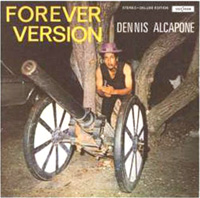
DENNIS ALCAPONE
FOREVER VERSION (Stereo deluxe edition Heartbeat 11661-7823-2)
Dennis Alcapone toasts over the hits of the day on Studio One's finest rhythms (heard here for the first time in stereo). The title cut is Carlton and His Shoes' "Love me forever" and the reason to get this new Heartbeat CD (the deluxe edition) is the extended mix of that song and a few other bonus tracks. In tandem with my passion for Cuban music performed by Congolese bands, I also love to hear Motown and Memphis songs filtered through the reggae soundscape. Leroy Sibbles' cover of Fred Neil's "Everybody's Talking" is a good example. Here it comes back on the track, Jack. Scrub it one time. As Alcapone explained, people would be at a dance waiting for their favourite track to come on, and when everyone had had a few drinks or spliffs he would slip on the dub plate which he had secretly acquired from the record producer, and when the crowd was expecting the vocals to come in, ready to sing along, they would get outrageous thudding bass instead and Dennis or U Roy rapping! The crowds went nuts, and of course, the actual song would be played after and maybe the dub plate again, over & over till the dancers had had enough. And like U Roy's free rein at Treasure Isle, Dennis Alcapone was fortunate to have the pick of some top Studio One tracks to toast over. The other gentlemen of this early DJ scene were Count Machuki, King Stitt, and my personal favourite, Sir Lord Comic (I only have three or four tracks by him & would love to hear more), with their urbane catchy patter over the familiar tunes. Dennis made 200 singles between 1970 and 73 when he moved to London. He also rode the hit rhythms from Treasure Isle on "DJ's Choice," recorded "Guns don't argue" for Bunny Lee, and cut some killer sides for Keith Hudson, found on the "Studio Kinda Cloudy" album. FOREVER VERSION includes Alcapone's first hit on Larry Marshall's "Nanny goat," the Pioneers' "Run run," Derrick Harriott's "Soloman" (also riddled by Scotty), "Baby why" & "Sweet talking" by Heptones, Alton Ellis's "Sunday coming," the Wailers' "Dancing Shoes," John Holt's "A Love I can feel," the Cables' "Baby why?" as well as John Holt & the Paragon's "Wear you to the ball," which was also versioned by U Roy. The additional tracks include Ken Boothe's "Home," his first hit "El Paso," on the "You don't care" rhythm also covered as "Mosquito one" (among other versions), Horace Andy's "Fever," the Clarendonians' "You can't be happy," and Delroy Wilson's "Trying to conquer me." (I list all the covers because the record label forgot to do so, assuming, maybe, you would know them all.) You can see it's a great collection of rocksteady to reggae hits. If you have any of the originals you will smile when you hear Dennis and his little trademark yells, and you will also notice how loud the bass got all of a sudden.
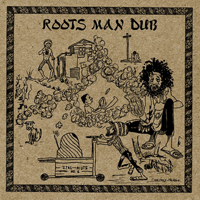
ROOTS MAN DUB
(Heartbeat 11601-7832-2)
The reported demise of Blood & Fire (& troubled times at Pressure Sounds) leaves the reissue field to labels like Heartbeat. Heartbeat have a lock on the Studio One archives which means most of the music is available, though they still find things to release that have not been on CD before. Their packaging is basic, nothing like the inspired efforts of B&F or the stylish Pressure Sounds, but this double CD (not all from Studio One) is quite informative and the music is generally great.
Dub is an acquired taste. Mainly it's for people who know the music and just want more of it. I used to spend hours making cassettes where i would string all the versions of a rhythm back-to-back so I could have 45 minutes of "Queen Majesty," "You don't care," or "Dread in the arena," & I would make augmented albums with dubs. This is now a standard way to issue reggae CDs so it saves me the effort and I can discover unknown versions of some old faves from people with vaster collections. Above all it's dreamy & induces well-being, it's perfect to put you in a good mood and it goes on in the background, almost unnoticed, until you find yourself humming along. Roots Man Dub is two albums of Alvin Ranglin productions, with lots of familiar Sly'n'Robbie grooves and the likes of Gladdy Anderson and Winston Wright on keys, BoPeep and Bingy Bunny on guitar, Sticky & Scully on percussion, and the great horn contributions of Bobbie Ellis, Vin Gordon, Deadley Headley & Dean Fraser. I must know "Tripe Girl" by the Heptones, though I can't say I know the words, even though Sugar Minott and Dillinger both did versions, but "Iron gate," an instrumental dub on the track is wonderful with its open feeling, simple use of repeat effects, sharp untreated congas and lyrical bassline. The second disc has a really unusual takes on "Midnight Hour" and "Stand by me;" Greg Isaacs is versioned and there a many dubs on a lesser-known singer George Faith, including his classic rhythm "The Whip." Famous tracks include dubs on "Never let go," "You don't care," "A love I can feel," & the "Heavenless" rhythm, as well as Tappa Zukie's "Right track" and the Maytones' "I don't know why" and "Africa we want to go."
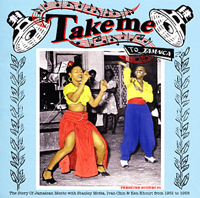
TAKE ME TO JAMAICA (Pressure Sounds 51)
Mento was the folk music of Jamaica in the 1950s before the influence of New Orleans (via radio airwaves) got everyone hooked on Rhythm & Blues which evolved into the famous local rhythms, Ska, Rocksteady and Reggae. Clarinet, pennywhistle, rhumba box and banjo are now rare in Jamaican music but were a part of the Mento sound, which, as this CD demonstrates, had strong ties to Trinidadian calypso. Lord Tickler's "Limbo" (recorded by Ken Khouri) sounds like it could be Trinidadian. There's even a hint of the son beat of Cuba in Lord Messam & His Calypsonians' "Monkey." Laurel Aitken came from Cuba and sang Mento for tourists getting off cruise ships in the early 50s. Harry Belafonte moved to the US from Jamaica and became the first person to sell a million LPs with his Calypso recordings. These tracks were recorded from 1951 to 1958 and this compilation does not duplicate other reissues on the market, like the crucial MENTO MADNESS and BOOGU YAGGA GAL. It includes important historic recordings like "Samfi Man," by Count Lasher, recorded by Stanley Motta, the first person to record music in Jamaica. Motta was a Sephardic Jew and director the United Congregation of Israelites in Kingston, who ran a hi-fi store and loved music. His first recording, a Mento medley, including "Linstead Market" & "Hold 'im Joe" by Lord Fly is included here (Other Lord Fly medleys can be heard on MENTO MADNESS). The songs (in English) are topical or sly social commentary. There are so many wonderful songs on here: "Guzoo Doctor" by Alerth Bedasse & Chin's Calypso Sextet, or his classic "Monkey's Opinion," which is still part of the folklore (and, like Lord Messam's tale, resurfaced in Ska songs). Of course there are no monkeys in Jamaica but the image is a strong part of the culture which is why we still find him in Toots Hibbert's "Monkey Man," an update of "Monkey Talk" by Hubert Porter (which can be heard on MENTO MADNESS). Another of the recording pioneers was Ivan Chin, who like Motta, sent his masters to Decca in England to be pressed. Decca, it turned out, preserved all his material and so it was available for this reissue, which is beautifully packaged with a thoroughly detailed booklet and historic photos.
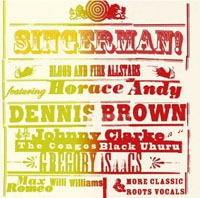
SINGERMAN (Blood & Fire BAF609 bargain-priced CD)
At once familiar and strange, this latest Blood & Fire compilation skims the cream of 18 releases to provide a tasty sampler that will send you back to their catalogue for gems you missed. I was pretty faithful to B&F for a while, buying all their elegantly packaged CDs in the mid-90s when they fired up & were putting out incendiary sets of King Tubby, Keith Hudson and the Congos. After the first 20 discs I became more selective so, though I know a lot of the music on here, I only have a third of the albums the 18 tracks are drawn from. The strangeness comes from the alternate versions on here. The album opens with Max Romeo singing "Fire in the Vatican," over his "War in a Babylon" backing track. He doesn't add much to it, but it is a curio and a must-have for Lee Perry fans. There's greatness on here: Gregory Isaac's "Storm" (impeccable with its ultra-cool, much-versioned, never-equalled groove), & Johnny Clarke's "Every knee shall bow," among many crucial cuts. The Chantells are an undeservedly obscure vocal trio from the late 70s dropping fine harmonies over a "Ruby & the Romantics"-type organ. You probably know Horace Andy's shaky take on "Man next door" with Massive Attack, and while Dennis Brown's "Man next door" here may be the original version, the one you known best is usually the one you prefer. Michael ProphetÕs "Fight it to the top" is another reggae anthem, as is Sylford Walker's "Chant down Babylon" (which was also versioned by Jr Byles). The hits pour like rain.
Somewhere below I said the Congos' remastered Heart of the Ark session was the pinnacle of reggae music and there's a sample here to remind us. Dawn Penn's immortal "No no no" is turned into a limp "Yes Yes Yes" by Errol Holt. I tend to ignore lyrics like "Jah Jah is the conquering Lion of Judah" which probably has great resonance for hardcore reggae fans, and, there are plenty of them here. The Duchess asked me if I had found religion when I was singing about the "Ark of the Covenant"! It might indeed be a great set of Rastafarian anthems if you want to make the connection, but as Philip Lamantia said, "Cultivate the vibes and let the theology slide!" More old friends from the late 70s show up: Yabby You with his "Deliver me from my enemies," and Cornell Campbell with "Bandulu." Junior Byles closes it out with "Remember me." If you want the long version of this soulful number you will have to get his Blood&Fire CD 129 BEAT STREET. (I wish they had used that version instead.) A couple of the selections are the lead tracks but the lesser-known selections are a delight and will send you back to the CDs, or to the record store.
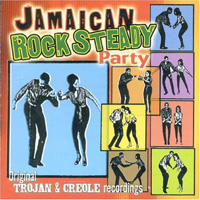
JAMAICAN ROCKSTEADY PARTY (Castle Pulse PLSCD825)
You know how you go to the store looking for one thing and come away with something different? Well, I went looking for this new Trojan comp DIP & FALL BACK, and while I was in the Reggae section I had my eyes open for a new Pressure Sound compilation of Mento also put out about 6 months ago. But I could not find either: the boat from Europe must have foundered at Cape Horn. But there was Jamaican Rocksteady Party staring me in the wallet at a budget price. I have a ton of Rocksteady already, but that's because I love it so much. I took a look at the playlist & knew immediately there would be some great discoveries on here, and I was not disappointed. Laurence Cane-Honeysett has gone to the vaults of Trojan and the Creole label (which I don't know) to put together this hour of mid-sixties laid-back groovers (the musical bridge between ska and reggae). There's the familiar sound: shuffling beat, thumping bass, cantering piano, gentle horn punctuation, harmony singing (not always in key), and a couple of little touches I love. A periodic high-pitched ka-ching on the guitar & a rumbling shuffle on the drums that is indescribable but is in relation to rocksteady what a similar drum fill was to Motown. Remember how the intro to Motown singles was often a complex little rubble-de-dub a-dub on the drums? At the time you always missed it because the deejay was talking over it. Jamaica picked it up and the drummer often does it as a kind of joie-de-vivre outburst in the middle of a song. In Jamaica it's more of a frrit flubba-de-dub. I don't know why I am going on about this, but it's the little moments like that which make Rocksteady so enjoyable. Sure it's a mirror of its North American counterpart, so you get Jimmy Reid, Curtis Mayfield and Dave Bartholomew covers, but I always prefer the Jamaicans' versions, like the Techniques' "Oh Babe (Sick & Tired)" present here. The discoveries are Glen Brown's "Ska Diap," Clancy Eccles' "The Revenge," which sounds like Prince Buster. Alton Ellis, a recent immigrant to Britain, does a terrible impression of a Cockney accent in "Some talk." Today many cockneys have Caribbean accents. The only well-known track here is Vic Taylor's "Heartaches," which makes a sweet capper to this hour of reverie. Overall this is a great set, nowhere as predictable as the TROJAN ROCKSTEADY BOX SET. Joe Gibbs, Derrick Harriott and Bunny Lee all have multi-volume Rocksteady compilations out, and I do recommend all of them, but for a single shot of sweetness this is choice.
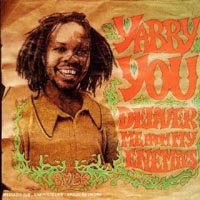
YABBY YOU
DELIVER ME FROM MY ENEMIES (Blood&Fire BAFCD051)
Now what enemies could smiling Rastaman Vivian Jackson (aka Yabby You) possibly have? The liner notes reveal that a policeman and his wife who were Jackson's landlords practiced Obeah or Black Magic, and that was enough to scare the young rastus into a flit. This latest Blood & Fire release (the 51st from the label that wont quit and always comes up trumps), reissues a varied album and fills up the rest of the CD with obscure bonus tracks: 12-inch remixes and unreleased dub plates. These latter half dozen tasty treats are what make this worth getting. The original album was recorded from 1977 to 1979 at Channel One and mixed by Prince Jammy at King Tubby's. It was Jackson's third and completed the trilogy begun by "Conquering Lion" and "Walls of Jerusalem," both available on Blood & Fire CD 021, JESUS DREAD. Many of the rhythms it rides are familiar as Sly'n'Robbie do their thing. Jackson covers John Holt for "Stranger in love," showing a sentimental side, but then things heat up with the dubby bonus material. "Jah Vengeance" & "Free Africa," on which Trinity toasts, spins us off into a giddy ride into the realm of the Roland Space Echo. The masters, Tommy McCook on flute & sax, Bobby Ellis on trumpet and Vin Gordon on (surprisingly abstract) trombone nicely daub jazzy background touches to the melodies. "Pick the beam" (i.e. take the mote from thine own eye to see clearly) is the best rhythm on here and comes back three times, It sounds like "Have mercy, baby," or "Mercy, mercy" -- an old soul tune. (I've ruled out Sam Cooke and Don Covay, if anyone knows it, please tell me!)
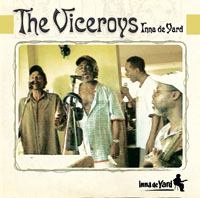
VICEROYS
INNA DE YARD (IDYCD005)
The "Inna de yard" series is a new venture from a French label Magasound. Their mandate is to record Jamaican artists in an informal setting, basically jamming in their back yards. So far they have put out albums by Cedric Myton, Linval Thompson, Kiddus I, and Chinna Smith. I jumped on this because I love the Viceroys' album YA HO which was a Heartbeat compilation of some of their early Studio One work. Formed in 1968, they are a classic Jamaican vocal harmony group with a lot of resonance from American Do-Wop and Soul. I love the conjunction of sweet harmonies and a pumping reggae beat, like on "Last night," and the bubbly organ & rootical bass on their hit "Ya ho" (with its simple lyrics about pirates --"Sixteen men on a dead man's chest"-- sound familiar?). The Heartbeat compilation includes an extended mix with nyabinghi drumming on the dub that is sublime. Wesley Tinglin, lead singer and composer, also came up with Rasta ditties like "Love Jah" and "Slogan on the wall," and on this outing they stick more to the Rastafarian anthems of the 70s, so don't do their rocksteady gems "Shake up" ("How you big fat lady!") or "Fat fish." The original backing singers are gone (after 40 years) but the harmonies of Neville Ingram and Michael Gabbidon work fine. The album opens with "Heart made of stone" accompanied by only Tinglin's understated vamping on acoustic guitar. This was his 1980 hit, produced by Sly & Robbie. Then after a-one and a-two, they break into a fantastic version of "Ya ho," with throbbing bass and half a dozen hands slapping drums. Chinna Smith plays a scratchy guitar. They do "Mission Impossible," which was originally their hit backing Winston Riley as the Interns, with flute & organ; it is so tight it sounds like a studio recording. The sound is rougher on "I guarantee my love" -- it lacks the youthful pep of the original and the mix is out of kilter, however the "Inna de Yard" authenticity saves it. The vocals are strained on "Last night" because it is pitched too high, but it is redeemed by live dubbing by Chinna, Bo Pee & Sangie's guitars (without any effects). You can't imagine a Reggae band who don't do a version of "Satta massagana," and the Viceroy's "Shadrach, Meshach and Abendigo [sic]" is choice. The album ends quietly with another solo acoustic guitar number.
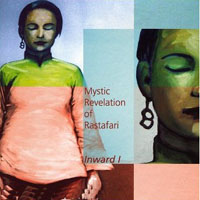
MYSTIC REVELATION OF RASTAFARI
INWARD I (Harmonia Mundi/Sound of the World SW 106)
I used to say that when I turned 50 I would put a floor mop on my head to simulate grey dreadlocks and join a reggae band as keyboard player. But some old bandmates of mine have my Hohner clavinet and recently someone made me an offer I couldn't refuse for my Fender Bassmaster top and twin 16" JBL speaker cabinet. Then there's the fact that as I get older I seem to become more intolerant. I have always despised religion but when people sing "I want to cross River Jordan," I image they are insane. Even if they are speaking somehow metaphorically. What's crossing River Jordan a metaphor for? Getting scuttled by Israelis? But if I had not given up smoking pot maybe I would fit in with some of the eldred bredren who noodle away in Babylon. Some of the best of the oldsters, Nambo Robinson on trombone, Dean Fraser on sax and Gibby Morrison on guitar, are heard on the new Mystic Revelation of Rastafari album INWARD I. This legendary band was started by Count Ossie who had such a profound influence on the musical scene in Jamaica in the 60s. He preached Rastafarianism at his camp in the Warrika Hills outside Kingston where young men gathered to sing and drum and smoke the herb. It's a good idea to tie your religion to a sacrament and the Bible makes ideal rolling paper. Inspiration most high! In 1966 Ossie contributed burru drumming to the Folkes Brothers' folksong "Oh, Carolina," turning it into the first ska hit. Horn-man Cedric "'Im" Brooks was an original member when his band the Mystics joined the burru drummers in the hills for a jam to celebrate African roots. I gave a lot of leeway to INWARD I, considering how absurd the lyrics occasionally seem to me, but there are fine (instrumental) moments in here ("I know") worth a listen. And I do sympathize with the black struggle against colonial oppression. The Nyabinghi drumming rolls like a river, so it's very soothing. Then the dub of Cedric Brooks' "Rasta Reggae" shows how it's done, with repeater, bass drum, and Sparrow on percussion.
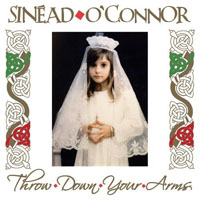
SINEAD O'CONNOR
THROW DOWN YOUR ARMS (THCVCD001)
Here's more problematic nomenclature. Shinehead O'Connor has made a reggae CD. (I've always called her that; if you try to say it in Gaelic it sounds like "Shinehead" anyway & she exacerbates it by shaving her head which always makes white women look like cancer victims.) The liner notes look like the Surgeon General's warning on cigarette packets. It's so small you can't read it, so skip it, but she does dedicate the album to her son Nevi'im Nesta Ali Shane O'Connor, poor bastard. Why should the kid suffer because he has a pretentious mom? White rastas are the living end (glabrous ones beyond belief!). And naming your kid for four religions (Jew, Rasta, Muslim, Druid?) as spiritual insurance is worse than giving your kid all the names of the national soccer team. OK, enough ranting before I say something I'll regret. On the good side you can finally understand the lyrics to all those great Jamaican songs. The Burning Spear songbook gets most attention. (Now there's a name! -- Hasn't he tried penicillin?) His "Jah no dead" is the opener. That original song provides the most remarkable moment in the film ROCKERS. No one was expecting Spear to sing then, sitting on the dock of the bay. The sound guy crawled towards him with a boom mike, staying out of shot while the engineer boosted the input level also getting the creaking sails, gulls, and lapping waves. (I heard this story from the recording engineer himself.) It was a one-take wonder and they run the ambient track right into the sequel: Third World doing "Satta." In addition to Burning Spear, Shinehead does Junior Byles, Abyssinians, Peter Tosh and Bob Marley's "War." A good mix of classics all reprocessed in the Sly & Robbie style. Sly & Robbie have become the grand old men of reggae and so they are chilling on this set with some of the Roots Radics in attendance. Not that I am saying there should be dancehall or syndrums on this, it's just that several folks have told me it is a brilliant album and I think it is decent, but mostly for newbies. But it's a lot better than Serge Gainsbourg. There are a couple of odd notes: Shinehead's Irish accent comes through on "Curly Locks," which is charming, but then she does what sounds like a Cornish accent on "Vampire" (emphasizing the absurd lyrics), perhaps emulating those salty pirates who settled Jamaica back in the days of Esquemeling. She ruins "Downpresser Man," by using the "F" word too many times, thereby negating its chances of being played on the radio. Then in a complete twist she puts on a Cockney accent with glottal stop for "Untold stories," a rap that is taken at a mellow tempo. All that aside it's a pleasant hour of reggae favourites. If you are too lazy to cue up the originals, or like singing along, here is your chance: "Obadiah, Obadiah, Jah-jah sent us 'ere to catch vampire!"
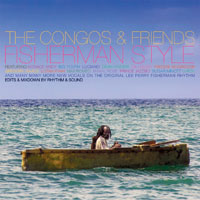
CONGOS & FRIENDS
FISHERMAN STYLE (Blood & Fire BAFCD050)
The version album is a well-established tradition in Jamaican music and here's a neat one. You could argue about the greatest Jamaican album ever and many would think that Bob Marley's CATCH A FIRE would be tops, but for me I think the Congos' 1977 HEART OF THE CONGOS, produced by Lee Perry, would take the prize. It's more than a collection of great songs, it's a mood, a state of mind, a place to go and feel good. The latest idea from Blood & Fire is to take one track from that album, "Row fisherman row," and get a raft of deejays to toast over the rhythm. "If the fish would keep his mouth shut, he'd never get caught," says U-Roy. And, to show how urbane he is "Japanese want some sushi in a dish, I-&-I want the steamed fish." But it's also a paean to Rastafari as many of the toasts take on Biblical tones. "Jah is the bus driver, Jah is the pilot of the hairplane," etc, avers Sugar Minott. For a devout atheist I spend an inordinate amount of time thinking about God, or Gods. It's hard not to, with the loony Christians, the monomaniacal Zionists and the bloody Muslim Jihadists all thrusting their tin gods forward. They forget they are all sons of Abraham, and as far as I am concerned the sooner they go to Hell the better for the rest of us. Whatever happened to Love thy neighbour? The stoic Rastafarians seem to be up for it. What's really satisfying about this album is the consistency. So many of these great names are still thinking up great lyrics, and furthermore they have musical voices: It's a roster (far-i) of Jamaican dancehall legends: Big Youth, Horace Andy, U Roy, Max Romeo, Prince Jazzbo (who tells us "Live good today and love good tomorrow!"), Dillinger -- and that's just the first disc. For like I always say, Nothing exceeds like excess. So there's a whole second set to keep you in the groove. But thank Jah for that groove. Bass and drums are the bare bones of this three-minute ditty. It's Paul Douglas on drums, and Geoffrey Chung holding down the bass which lopes along (dare I say) incessantly. There's also percussion by Scratch and Sticky. I think Lee Perry is bouncing a drum stick on the top of the space echo. Barely audible are Winston Wright on organ and Billy Johnson on guitar, run through the Roland Space Echo. The song itself is derived from an old Jamaican folksong, and of course lends itself to Biblical thoughts, as Jesus and his pals fished the inland sea of Galilee, when they weren't telling tall tales or chasing girls. So as well as thoughts of Rastafari calling us there's the occasionally appearance of the "Ya-ho" chorus with the unmistakable falsetto of Cedric Myton and the harmony of Roydell Johnson and Watty Burnett. (Cedric told me he thinks Watty Burnett has the greatest voice in all Jamaica.) The metaphoric destination Babylon is still omnipresent but there's a supreme irony in the fact that its geographic location has moved from Iraq to New York and the global hegemony of US corporations that answer to no government or deity. Carthage and Rome are also on these singers minds, with the same metaphoric impulse, not to mention my favourite (from Jazzbo), "pure frustration down in Sodom and Gomorrow." The second disc is mostly newcomers, with the exception of Greg Isaacs who appears late in the set. Of course they could have left off the second disc, but then we would miss out on the new contenders (who sound just like the old guard) of dancehall toasting preachers. Version albums are an acquired taste. Rupie Edwards' LET THERE BE VERSION (Trojan) which was all on the "My conversation" track of Slim Smith was first and is arguably still the best, but this one is a keeper.
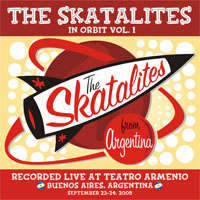
SKATALITES
IN ORBIT (self published)
This might just as well be called "Then there were two," because drummer Lloyd Knibb & sax player Lester Sterling are the only original members remaining in the Skatalites. To reprise their well-known history: four of the lads were raised at a vocational school run by nuns in Kingston called Alpha School for Boys. They had a devoted bandmaster and music teacher, Lennie Hibbert, who taught them classical music and jazz improvisation. After leaving school they all joined bands; many were inducted into Eric Deans' Colony Club Orchestra in the 1950s. "They had more soul than army band graduates, and could improvise," said "Coxone" Dodd, who hired them as the house band for Studio One, where they backed everyone from Bob Marley and Alton Ellis to one-shot unknowns who came to audition. Saxophonist Tommy McCook was the bandleader, Rolando Alphonso and Dizzy Moore also played horns. The genius Don Drummond played trombone and Jackie Mittoo (a child prodigy, not from Alpha) was on keyboard. These latter two were the most talented writers. Though singers came to the studio with melodies, the arrangements were collectively produced by the band. Don Drummond added a melancholy note to the effervescent lilt of the ska beat. Tragically, Drummond stabbed his girlfriend on January 1, 1965 and committed suicide in mental hospital four years later. With Drummond's departure, and ego clashes on the bandstand, the group only lasted a few months before they disbanded & members moved to different continents. In 1983 the Skatalites got back together to reap the benefits of the sudden re-emergence of Ska with groups like the Clash, The English Beat and the Specials creating a new market. The STRETCHING OUT sessions (featuring all original members), recorded 1983 at the Blue Monk Jazz Gallery in Kingston, prompted renewed interest in these now elder statesmen of Jamaican music. So again in 1989 they reassembled and began touring the world but with fewer and fewer original members. (Each time I saw them I would feel the pain of another notable loss.) However their versions of some classic instrumental tunes, like "The Guns of Navarone," or the "James Bond theme," have eclipsed the originals and are a joy to hear. This latest recording was made with an appreciative crowd in Buenos Aires in September 2005. There are no surprises but lots of hits, including "El Pussycat," "Ball of fire," "Phoenix City," and the essential "Rockfort Rock." They trot out Doreen Shaffer for some vocalising, and I wonder they don't try to find the Lone Ranger, King Stitt or Sir Lord Comic to do some toasting. Their set list has become pretty static for the last fifteen years and, given the wide variety of music they did record, it would be interesting to hear them try some other material and maybe record with some of the surviving vocal harmony groups before they are all gone.
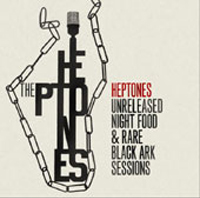
HEPTONES
UNRELEASED NIGHT FOOD & RARE BLACK ARK SESSIONS (Auralux LUXXCD011)
The importance of the Heptones to Jamaican music cannot be overstated. Their songs are so popular and so ingrained in the national consciousness that they have become surrogate folk songs: Everyone knows "Fatty Fatty," I've got the handle," "In the groove," "Gonna fight it," "Love wont come easy" and so on, and they are recycled in dancehall lyrics and are now part of the cultural fabric of the island. Years ago the Heptones reformed for a tour of North America and I was blessed to see them in a small club where they bantered with the audience and took requests which they delivered in unfalteringly sublime harmony. It was one of those nights that true muzikifans live for! They first got together in Trench Town in the late fifties, singing on the corner but not taking themselves seriously until they heard their debut single on the radio. Then they went to Studio One and began to write and record in earnest. Leroy Sibbles took up bass guitar and learned by copying the left hand patterns of genius keyboard player Jackie Mittoo. His style changed the course of music because now all reggae bass lines have that left-hand "first-third-fifth" vamp going. His early efforts were on "Full Up" by the Soul Vendors and "Satta massa gana" by the Abyssinians. You can hear him play bass on all of Alton Ellis' Studio One sides. After their 5-year contract with Coxsone was up, the Heptones went freelance and recorded at an array of other studios, but it was their classics "Country Boy" and "Book of Rules" for Harry J that endured. Though it's touted with the mystical Black Ark label, most of this album was recorded at Harry J's studios.
On the verge of success, the Heptones were booked to tour the UK with the Wailers and Toots and the Maytals in 1973 but Leroy Sibbles got married and emigrated to Canada leaving Barry and Earl high and dry. Two years later he got back with them to record NIGHT FOOD for UK-based Island records. This high profile issue recut their previous Studio One and Harry J hits and added a dreamy version of Holland-Dozier-Holland's "Baby I need your loving." After NIGHT FOOD, Island had the ideas of sending the trio into the Black Ark and having Lee Perry, then at the height of his creativity, work his metaphysical magic on them. PARTY TIME was their most challenging and complex album since ON TOP (Studio One). It includes a sublime version of Dylan's biblical "I shall be released." (Disclaimer: this is the only time you will hear me use "sublime" and "Dylan" in the same sentence.) The Heptones in fact were friends of Perry and added backing vocals to seven of his greatest works. Earl Morgan recalled, "We go there one night and he doing an album with Max Romeo and he say 'Come do some work,' so we do WAR INNA BABYLON. Just start hum a little thing behind 'it sipple out there.' We harmony Junior Murvin's POLICE AND THIEVES, COLUMBIA COLLY with Jah Lloyd, we do the Congos album..." With Sibbles back in town the trio appeared on the "ethereal dub masterpiece" SUPER APE. This new CD then presents the out-takes of both albums. The NIGHT FOOD session, recorded 30 years ago at Harry J and backed by the Wailers band, without overdubs, has a pleasingly big booming sound. Sibbles' lyrics are to the fore and each song has a dub plate companion. The songs alternate between mushy romanticism ("Crying over you") and politically conscious ones ("Mr President"). These outtakes, taken alone, may not have spurred many buyers, but as lagniappe we get the extended mixes of four of the Black Ark sides which are well-known but add Ranking King, an obscure deejay (with a dubby name!), toasting on them in slightly different mixes from those Scratch previously issued. The cuts are a bit choppy when he slices into another take with, say, nyabingi drumming, but any new Black Ark material from this era is a revelation. They are like lost Mozart sonatas. The new mix of "Sorrows" quotes George Harrison's "Something in the way she moves." This is not necessarily a good thing, but an unmistakable hook! "Mystery Babylon" and "Party Time" are classic songs, worth hearing over and over again. Aside from the cover, the package is handsome & informative, and there are wonderful photos by Adrian Boot, but above all some of Jamaica's finest artists return in their peak in clean and clear sound.
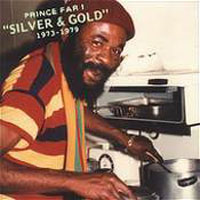
PRINCE FAR I
SILVER & GOLD 1973-79 (Blood & Fire BAFCD049)
There's no let up in the gems Blood & Fire are unearthing or reviving for our jaded ears. The latest is a neglected Jamaican deejay named Mike Williams, but known to us as Prince Far I. He had a voice like a wizened pirate with a peg-leg and a snoot full of rum. None of the LPs I have by him has any liner notes so it's great to listen to him again and also learn a bit about his career. SILVER & GOLD kicks off with a track I had never heard before: a version of one of my all-time favourite reggae songs, the Slickers' "Johnny Too Bad," this one called "Johnny Get Worse." It's crackin! Then we get really Biblical, well Methodistical, with a chorus of "You are my sunshine," or is it "Jesus wants me for a sunbeam"? Anyway I recognized it from Sunday school; here it's called "Yes Joshua." But what we are waiting for is the crumbling dub that shows up with "Let Jah Arise": some gravelly toasting over a pounding bass (Flabba Holt). Melodica (must be Augustus Pablo) floats by. Fish Clarke on drums grounded Far I's band, The Arabs, & these unsung talents bring a lot to the sessions. "Jah Dub version" continues with some religious remarks over what appears to be the tune to "Slavery Days" by Burning Spear. In 1976 Far I started his own label, Cry Tuff (named after the Alton Ellis song), and released a couple of singles by Errol Holt with his own toasts on the B-side. These are both included in their entirety here, along with three versions of another early gem that is the title cut. Other really fine moments occur during "No more war" and the version (which is more like a version of a version). The original is a floating instrumental dub of Little Roy's "Tribal war." It's interesting to see the contrast between Far I's intense lyrics and the muted spacey instrumental.
In the late 70s Far I's UNDER HEAVY MANNERS album was a huge hit in the UK. Trojan put out the Cry Tuff Dub Encounters which did well, and Virgin signed him to a five-year contract. In the event he only did three albums for Virgin. A newspaper clipping from Jamaica's paper The Weekend Star, September 1983, tells the grim story with its mundane headline: "Gunmen invade homes, kill two men." There are still good recordings by Far I on the market. UNDER HEAVY MANNERS has been reissued by Trojan as a double CD with extra material, and Pressure Sounds have put together the songs and versions of the suite of PSALMS FOR I (PSCD35) he recorded in 1975 over well-known Bunny Lee and Lee Perry rhythms. If you haven't used your Old Testament for rolling spliffs, you can read along and discover Far I's exegetical skills on well-known homilies such as "tis easier for a camel to go through the eye of a needle than for a rich man to enter the Kingdom of Jah!" Righteous!
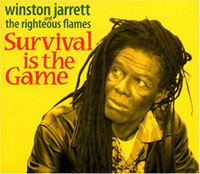
WINSTON JARRETT & THE RIGHTEOUS FLAMES
SURVIVAL IS THE GAME (Young Tree Records YTR-1225 CD)
If you need grounding in some roots reggae here is the perfect set: put it on, turn it up, and kick back. Two discs from one of the overlooked greats of reggae music: Winston Jarrett. I've been waiting for this reissue for years, as I can never locate the songs on the cassettes I have in my "tape archive" (shopping bags in a corner of my studio under some machinery). In the early 60s Jarrett moved to Trench Town, Kingston, unable to connect with his father because of his Rastafarian beliefs. He met Alton Ellis and the two wrote songs together and performed as Alton and the Flames. Jarrett wrote "Sunday coming," one of Ellis's biggest hits. In 1969 Ellis moved to London after a successful European tour and Jarrett took over as leader of the (now Righteous) Flames. Like a few other pioneers, their music spanned Ska, Rocksteady and the emerging Reggae sounds. Jarrett and his group moved from studio to studio, usually running foul of producers who stole their material and issued it under other names. This disc, for the first time, reassembles the key recordings of Jarrett's prolific career and adds the dub sides cut at Channel One by King Tubby. His friends the Hippy Boys backed him on those sides but then told him they had signed an exclusive contract to Bob Marley and were changing their name to the Wailers. I'd venture that "Humble Dub" is one of the Wailers' greatest ever recordings. Jarrett hired musicians (like Jackie Mittoo) and booked time at Studio One but when he had finished the session, Coxsone refused to give him the tapes, releasing the songs under the name Righteous Holmes. Other producers treated him equally shabbily. The great Roots Radics backed him on the classic KINGSTON VIBRATIONS from which the songs "True born African" and "Roots rock reggae" are drawn. The previously unreleased "Do you hear I?" from 1979 sounds like a Black Ark production: I think that's Lee Perry as the second voice, but the sleeve says it's Studio One. Maybe it's Jarrett paying back Lee Perry for taking his material and releasing it as the Hurricanes. Jarrett now lives in Seattle, Washington, and has only recently managed to regain control of his master tapes from the many Jamaican studios who had possession of them. This album is a monument. In addition to his wide repertoire of classics -- Fear not, Humble yourself, Up Park Camp, Solid Foundation, True born African, etc.-- we get the dub plates and, finally, an explanation of who is on these sides and why it's taken so long to get them all back together.
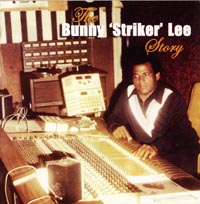
THE BUNNY 'STRIKER' LEE STORY
(JET STAR CRCDB3138)
I jumped on this 4-CD box because it had some unfamiliar titles and was priced as a single CD, but it goes to show you, quantity isn't always quality. I already have a pricy Bunny Lee "set" of 3 CDs that came out on Jamaica Gold in 2000: SIR LEE'S ROCKSTEADY PARTY AT BUCKINGHAM PALACE (JMC 200.248), SIR LEE'S ROCKSTEADY PARTY AT KING'S HOUSE (JMC 200.249), & SIR LEE'S ROCKSTEADY PARTY AT GREENWICH FARM (JMC 200.250). That trio focuses on the Rocksteady era of the late 60s which was Bunny Lee's moment in the spotlight; this new set moves up into the Reggae era when he mostly seems to have re-versioned his old rhythms and also produced covers on other singers' hits with his own house artists. Neither the three discs on Jamaican Gold nor this new set on Jet Star comes near the succinct one-shot LP on Trojan, in their Producer's series, called JUMPING WITH MR LEE 1967-8 (TRLS 270). Lee would have remained a minor producer but for his association with Slim Smith and his vocal trio The Uniques. Formed as a splinter group of the Techniques, the Uniques teamed up with the brilliant Smith (whose pained falsetto occasionally verges on hysteria), and had a string of hits, remaining faithful to Bunny Lee's studio. "The Beatitude" (based on Christ's Sermon on the Mount, beginning "Blessèd are the meek..."), and "My Conversation" were massive hits. "My Conversation" was so frequently versioned that I believe it was the first song to be given an entire album and led to the uniquely Jamaican institution: the version album. They also covered Buffalo Springfield's "Watch this sound" and a bunch of Curtis Mayfield & the Impressions hits, which sound fabulous in the laid-back Rocksteady groove. Other great singers like Horace Andy and Pat Kelly also cut sides with Mr Lee (Horace Andy reworked his "Skylarking") and this four CD set gives a pair of tracks to each artist that passed through his studio. However, if you take out the Slim Smith tracks, there's about enough good material for a single disc here. So it's up to you whether you want to wade through these four hours and then maybe remix your own single disc, or look for the Trojan album and a Slim Smith CD.
My picks from this collection include Cornell Campbell's "Stars" -- one of the great reggae singles of all time, Ken Parker's "Sad mood," Slim Smith's "Just a dream," Max Romeo's "Wet dream," John Holt's "Stick by me," with a Dennis Alcapone version, and Jackie Edwards' I'm still waiting." Worthwhile rarities include Johnny Clarke's "Every knee shall bow" and "Rock with me baby," coupled with U-Roy's versions.
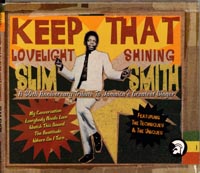
SLIM SMITH
KEEP THAT LOVELIGHT SHINING (Trojan 06076-80461-2)
One of the things you notice about Reggae is that often a singer will cover a well-known American pop song but it has nothing to do with the original tune or melody. I think this comes from reusing tracks that are already laid down in the studio. The band is pumping away on two chords and the singer decides to launch into a Marvin Gaye or Shirelles cover. Sure, he knows the words, but just adapts them to the new chord sequence. The result is a little unsettling because you want some semblance of the original tune. In the case of Slim Smith it doesn't matter, because he has a great voice, a high tenor that almost loses it when he gets out there, not exactly religious shoutings of ecstasy, more a tortured lover about to crack. His voice worked really well in concert with others, and so his early group work with the Techniques and then the Uniques is among his best. But then, typical of many singers, he had to go solo and had a short but glorious run of hits before his tragic death at 24. This two-disc set on Trojan hints at his early work with the vocal groups and skips over his early success with Coxone Dodd, focussing on the tracks laid down for Bunny Lee. The generic quality of some of the rhythms is tedious, especially when there's a great Goffin & King melody waiting to break out if only the musicians knew what they were playing (sometimes I suspect there are no musicians, just an engineer looking for a track to recycle that has the right feel.) But then they redeem themselves with a gem like "It's alright." I thought I would enjoy this set more than I do. That's not to say it's not worth hearing, but the rarities, like his version of "Spanish Harlem" or "Ginny come lately" are only curious and not up to the standard of his immortal cuts like "I've been terrorised," "It's alright," "Send me some loving," "Rain from the Skies," or "The time has come." The ten tracks on his Studio One album BORN TO LOVE (released on CD by Heartbeat) comprise his best work in one concentrated blast, and none of them is included here, but this is still a megadose of his great voice.
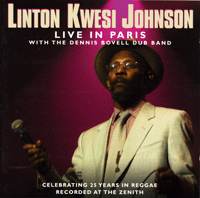
LINTON KWESI JOHNSON
LIVE IN PARIS (Wrasse Records WRASS 140)
Subtitled "Celebrating 25 years in reggae recorded live at the Zenith" this is the same set I reviewed when LKJ played Maritime Hall in SF before it closed last year [see below]. Johnson has mellowed somewhat with age but it's still welcome to hear him recite "me want fi go rave" and other immortal lines. I am not sure what passes for lyrics in urban black music today but I know instinctively it's grim and I shut it out. So here's an empirical test: I'll turn on MTV (which I never do as a rule) and write down what I can catch of the lyrics: (one minute later) Boy that was horrible! Here it is, though, from "The Candy Shop" by 50 Cent featuring Olivia: "This work we do/ and where it do/the things we do/are between me and you ... give it to me baby/nice & slow/ when I'm on top/ like Romeo ... get a taste of what I've got/ keep going till you hit the spot/ I'll take you to the candy shop/let you lick the lollipop/want a taste of what I've got/you're going to hit the spot." (as seen on FUSE at 10:50 a.m. Friday Feb 18, 2005) Now that has to be the worst piece of poetry EVER written, though I suspect it's typical of lyrics in the seedy world of Empty Vee. Actually it was hard to write with all the grinding vixens in tight satin hot pants. No wonder youth culture is going to pot!! So, what's my point? Here's LKJ in contrast:
Shock black bubble down beat bouncin'
Rock wise tumble-down sound music
foot drop find drum, blood story
bass history is a moving
is a hurting black story ...
There are echoes of Dylan Thomas here, so LKJ obviously studied poetry. Thomas was no John Donne but certainly a worthy contemporary model for a young poet to emulate. Add a political edge and you have some tough lyrics that are provocative and engaged. While American rappers are solely interested in bling and getting their lollipop licked, LKJ is screaming outrage at the oppression of black youth in England, and social injustice. Another Nazi pimp, John "Deathsquad" Negroponte, is put in charge of the new Amerikan SS while the youth of America is enrapt in the lyrics of 50 Cent which aren't even worth a wooden nickel. Blacks in America don't have it so good that they can afford to ignore what their masters are up to. LKJ gets his message across with one of the best reggae bands in existence. Dennis Bovell's bass is the lead instrument and is surrounded by jazz guitar and some cracking percussion. They add violin and harmonica to great effect. When LKJ sings about the "License fi kill," the violin solo quotes the "Death March from Saul". On top floats the message of LKJ. His first album "Dread beat an blood" is still his best-seller and it is a classic. He started out just reading his poetry to conga accompaniment and among his other contributions to culture, he published the work of Michael Smith on the LP "Mi cyann believe it." Since then he has gone out fighting the good fight and not compromising. "Fascists on the attack: we're gonna fight them back!" Wise up, youth. Word.
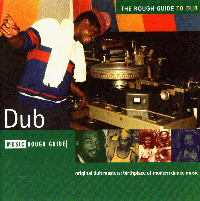
ROUGH GUIDE TO DUB (RGNET1149CD)
Even Homer nodded and in this case the great Steve Barrow seems to have lost the plot. There are already a couple of compilations of Blood & Fire dub tracks and this is a third one. Don't let the Rough Guide name fool you: it's all licensed from Blood & Fire, and should be called "King Tubby's Roots of Dub," because there's only a narrow area of early 70s Dub on offer here. There are a few bright moments: the opening cut has the famous "leave the studio" discussion of Scotty reworked by ET (Errol Thompson). Prince Phillip sounds eerily like Horace Andy on a reworking of "Satta," the Abyssinians classic rhythm, recut by Aggrovators. The Congos check in with "Noah sugar pan," a masterpiece from their immortal "Heart of the Congos" produced by Lee Perry. But is there anyone who doesn't already have the Lee Perry or enough King Tubby dubby albums in their collection? Barrow's old label, Trojan, put out the best King Tubby collection: KING TUBBY'S SPECIAL 1973-6. Their subsidiary Attack Records put out a couple of good King Tubby compilations also. The Duchess got mad when I put this on and got into the bath (I love dub in the tub): the sameness of it really irked her (it does go on and on and, well, on) and she forwarded it a few times before taking it off. They could have obviated the monotony by fast-forwarding to Dennis Bovell and Adrian Sherwood and shown the evolution of dub to today. Check out one of the good Blood & Fire comps instead: DUB GONE CRAZY (The Evolution of Dub at King Tubby's 1975-9) or Keith Hudson's PICK A DUB.
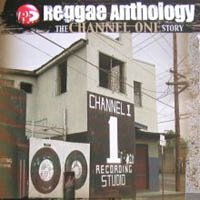
REGGAE ANTHOLOGY: THE CHANNEL ONE STORY (VPCD1678)
The popularity of reggae grows exponentially but there's only a limited amount of it in the vaults, so a massive repackaging industry has grown up mining the same material for lost nuggets, or simply coming up with snappy packaging to retread the grooves. We have heard all the great stuff, though occasionally some overlooked gems resurface like the recent Mighty Threes compilation. Channel One was the studio of Ernest and JoJo Hoo-Kim, not as well known as Coxsone Dodd, Duke Reid or Lee Perry, but they did have an interesting stable of musicians including Black Uhuru, Jr Byles, Wailing Souls, the Jays, Horace Andy & others who defected from the bigger labels. A great house band called the Revolutionaries featured Sly and Robbie. Not only were this duo the most prolific drum-n-bass in Jamaican music, they introduced a new style at Channel One called "rockers", that swept Jamaican popular music and caused the other labels to remix albums adding a doubled-up drum sound to match the busy work of Sly. Ernest Hoo-Kim, the engineer, would sometimes spend a whole day getting the drum sound right but it paid off as the live sound was crucial to the success of Channel One. Some great freelance talent completed the house band, including Sticky and Skully on percussion, Dean Fraser and Tommy McCook on saxes, Vin Gordon on trombone, Bobby Ellis on trumpet, Tony Chin and Chinna Smith on guitar, as well as the under-rated Gladdy Anderson on piano and Touter and Ansel Collins on organ and funky clavinet. In the 1970s Channel One put out a steady stream of hits, remakes and covers. In 1989 Heartbeat issued a vinyl compilation that included "Sun is shining" by Black Uhuru, Jr Byles' immortal "Fade Away," "Tings n time" by the Wailing Soul, and an unreleased "Stoned out of my mind" by the Mighty Diamonds (a stonier version of the Sylistics' hit). "Queen Majesty" by the Jays with Ranking Trevor signaled a new departure for Jamaican music, a song continued into the toast, rather than being an A side B side, and this simple move, usually on a 10-inch single, also had a huge impact on the sound.
One of the things we overlook is how sophisticated Jamaican music was in those early days. It was not long after the Beatles pioneered 8-track recording at Abbey Road and Jimi Hendrix broke through with 16 tracks at Electric Ladyland (giving one track each to the bass and drums and reserving the other 14 for himself!), but the Jamaicans had already figured out overdubbing, using a four-track console, and the use of effects like echo and reverb that is an unmistakable part of the sound. From the outset it was crisp and clear. Channel One was the underdog, the voice of the oppressed. They came along after Studio One, Treasure Isle and Prince Buster were well established but immediately had hits with Delroy Wilson ("It's a shame"), the Meditations ("Woman is like a shadow") and Horace Andy ("Girl I love you"). Some of the lyrics sound a little weird now, if not outright sexist and stupid, but, like the poet said about going to mass, "dig the vibe and let the content slide." By emphasizing the militant drum style of Sly Dunbar and introducing young toasters like Dillinger (though his cute rapping can get irritating the third time you hear it), Channel One had a huge impact on Jamaican culture throughout the seventies. After the demand for Sly-n-Robbie took them away, the house band evolved into the Roots Radics, certainly one of the hardest bands ever to come along. When I saw them backing Gregory Isaacs in 1984, I was astounded at their dubbing live on stage! Among the oddities here is their version of "Taps," called "Burial." It's appropriately lugubrious and a bit eerie (I first listened to this album driving to a funeral so it was mighty strange to have this come on!).
This 2-disc set is a great introduction to Channel One. Even if you know their stuff it's welcome, though, as usual, it could have been done better as a single disc and a lot of the filler omitted, but the set is priced as a single disc. I'm sure they could have found a better Clint Eastwood cut that "Prima ballerina" or Delroy Wilson's awful "Sharing the night together" which has a wretched synth lead on it. They should have used his "It's a shame" instead, but maybe are saving it for a follow-up compilation. There's another awful track called "Roach killer" by Super Chick who sings (off key), "If you miss the train I'm on, then you know I am gone, Lord I'm 45,000 miles away from home..." That puts her somewhere in outer space, where she should have stayed. She also manages to sing the tune of "Knick knack paddy wack"! But there are gems on here: Don Carlos' "Natty Dread have credential," as well as the crucial "Fade Away" of Junior Byles; we get Sugar Minott's "Babylon," the extended "Queen Majesty" mix, Leroy Smart's "Without Love," and "Tings and time" by Wailing Soul (Originally waxed at Studio One). An unlooked-for surprise is "Welding" -- I Roy's take-off on Stanley Beckford's "Soldering." Among the covers, I do prefer the Techniques' "Queen Majesty" but it doesn't have the toast, and the Jays' cover of "Yaho" doesn't touch the Viceroys. Once it got past remaking songs from other studios, Channel One took off, particularly as Dancehall came along, and the great early artists of that genre, like Yellowman and Frankie Paul, are well-served here. Few surprises, but this is still a great big serving of reggae.
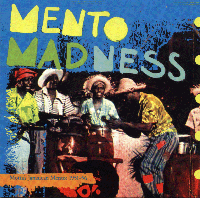
MENTO MADNESS
Motta's Jamaican Mentos 1951-6 V2 Music Ltd 63881-27201-2)
As a British colony, sharing the English language with Guyana, the Bahamas, Trinidad and Tobago, Jamaica also had a musical heritage in common. It is well-established that calypso was the great-granddaddy of reggae and got there through Mento and Ska. Jamaican calypsos are a confused child as they were often adapted from Trinidad, or sung by Trinidadian artists, but historians of Jamaican music haven't made the skip across the water to establish their ancestry. I know this because of the intense research by my friend Ray Funk who is systematically documenting the entire history of calypso in all its manifestations. He is no longer surprised by the reggae scholars' lack of historical perspective. MENTO MADNESS is a new compilation of Jamaican music that fills another blank in the calypso family tree on the way to buru and the roots of reggae. Here are standards like "Linstead Market," "Slide Mongoose," "Long time gal me never see you," and "Healin in the Balmyard," alongside new but familiar-sounding tunes such as "Solas Market" and "Old Lady O." My previous knowledge of Mento was restricted to the cultural treasure Louise Bennett, Stanley Beckford, the Jolly Boys, and a compilation from the Jamaican Cultural Development Commission, featuring Rod Dennis, Kew Park, Mount Peace and the Blue Glaze Mento band, who do "Rukumbine," "Come back Lisa" and "Bredda Ram Goat." This new release features earlier artists Lord Fly, Harold Richardson, Lord Composer, and others produced by Stanley Motta. (Bear with me, the design of the booklet is atrocious and I had a hard time scanning it for information.) Stanley Motta was a Sephardic Jew whose forebears had fled the Spanish inquisition. He loved the lower-class patois of Jamaican Mento and started the first record label in Kingston to publish it, over twenty years after Trinidad had conquered the New World with calypso (though it was Belafonte and the Andrews Sisters who had the hits). Not only are the names obviously borrowed from Trinidad, some of the lyrics ("Monkey Talk") are straight cops too. Sax-player Lord Fly's song about Manassa and his incredibly tight pants sounds like straight calypso, but Mento has its own sound: banjo, raucous rumba box, bamboo sax, one-string bass, and lively lyricists. The gems on here are Harold Richardson and the Ticklers' "Healin in the Balmyard" and "Dry Weather House" by Hubert Porter, backed by George Moxey and his Calypso Quintet (with great clarinet).
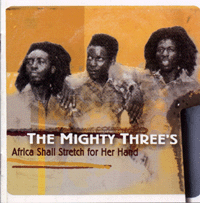
THE MIGHTY THREES
AFRICA SHALL STRETCH FOR HER HAND (Makasound 5340334)
Well, glory be. I thought the history of Jamaican vocal trios had been written long ago. But here's another lost gem from the 1970s: a one-shot wonder group that had three hit singles and one album, released in 1979. Noel Brown, later of the Chosen Few, got together with Bernard Brown (his brother?) and Carlton Gregory to harmonize in the style of the Techniques or the Kingstonians. The Mighty Threes went into Concert Studio to cut this album with friends, who were more than competent but remain totally unknown today. The album was also accompanied by a Dub plate which is very tasty. It's not that original but nevertheless takes a good shot at the Wailing Soul and Congos territory. As usual the lyricists lean on Old Testament sediments and the Methodist hymn book ("Star of wonder, star of royal beauty bright!"). You have to ignore lyrics like "When we reach up a-Canada, we['re] nearer to Mount Africa ... Nearer to thee, o Jah!" In fact the lyric morass has to be let slide into the ambience of reggae. (Which is worse? Jah Jah babytalk or Booty slangtang vulgarity?) Makasound, a new French label, put it all together with the one single that wasn't on their album (& its version side), cleaned up and handsomely packaged. A "Big Up" to Spliff Skankin for turning my ears towards this!
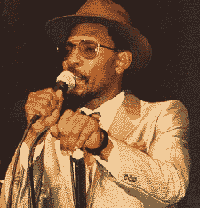
LINTON KWESI JOHNSON IN CONCERT
MARITIME HALL, SF, OCTOBER 1999
Linton Kwesi Johnson made his first appearance in San Francisco in 9 years on October 21st and it was an awe-inspiring evening of poetry and dub and a privilege to be present.
At first I thought I was going to have to leave, because the band hadn't done a sound check and there was too much feedback. People were skanking on the spot because their shoes were stuck to the floor by the spilled suds of beer, then the swirling lightshow repetition of blurry video images of Haile Selassie, African lions, and Bob Marley started to seem trite and oppressive. However when LKJ appeared things really brightened up and the band fell mesmerized into perfect place behind him. These musicians have been together since the start and John Kpiaye on guitar and of course Dennis Bovell on bass could turn on a dime. The solos were tight and the last eight bars of each song were the point where everyone got to throw down anything they wanted. It was so great you didn't need any ganja -- besides which the Maritime's Rastafarian Stormtroopers had confiscated it all! Wearing a fedora and shades to lend mystique to his slight figure, the elegant LKJ did two songs from each of his half-dozen albums, opening with the challenge of "Fite dem back" from "Forces of Victory." Then he showed that his new recording MORE TIME has returned to the feel of his earliest protest poetry. Not that it went away, but his conscious lyrics on "Dread Beat and Blood" and "Bass Culture" are outstanding documents of modern poetry.
I don't know if Clown Prince Charles or Tony Blair is into reggae but I wouldn't be surprised to see LKJ knighted for his major contribution to British culture -- then again I would be very surprised, but it's certainly an honour he deserves. His introductions were terse and moving and brought home the message of such classics as "Sonny's Letter," about the English police's powers to arrest anyone on suspicion of anything. He even did a couple of pieces a capella, unphased by the drunk frat boys yelling "Mash it up," as if they knew what that meant. The dub band cooked on the classics. All that was lacking was Rico's trombone part which was taken by one of the keyboards. The hilarious skinhead refrain, delivered in perfect cockney, "We gonna smash their brains in, 'cos they aint got nuffink in them," had me singing along at the top of my lungs.
In a perfect world every rap artist would have to memorize half a dozen LKJ poems before they were allowed loose in a recording studio with their litany of Ho-bitches and muthafuggas and niggadisses and niggadats. I'd recommend they start with "De black petty booshwa" and think about their own aspirations. If they had half the integrity of LKJ they might aspire to be a cultural treasure beyond value.